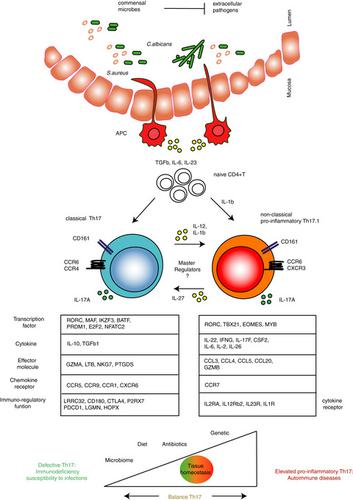当前位置:
X-MOL 学术
›
Immunology
›
论文详情
Our official English website, www.x-mol.net, welcomes your feedback! (Note: you will need to create a separate account there.)
Cytokine‐regulated Th17 plasticity in human health and diseases
Immunology ( IF 6.4 ) Pub Date : 2020-10-16 , DOI: 10.1111/imm.13280 Silvia Cerboni 1 , Ulf Gehrmann 1 , Silvia Preite 2 , Suman Mitra 3
Immunology ( IF 6.4 ) Pub Date : 2020-10-16 , DOI: 10.1111/imm.13280 Silvia Cerboni 1 , Ulf Gehrmann 1 , Silvia Preite 2 , Suman Mitra 3
Affiliation

|
Upon activation, naïve CD4+ T helper (Th) cells differentiate into distinct Th effector cell lineages depending on the local cytokine environment. However, these polarized Th cells can also adapt their function and phenotype depending on the changing cytokine environment, demonstrating functional plasticity. Here, Th17 cells, which play a critical role in host protection from extracellular pathogens and in autoimmune disorders, are of particular interest. While being able to shift phenotype within their lineage, Th17 cells can also acquire characteristics of Th1, Th2, T follicular helper (Tfh) or regulatory T cells. Th17 cell identity is determined by a spectrum of extracellular signals, including cytokines, which are critical orchestrators of cellular immune responses. Cytokine induces changes in epigenetic, transcriptional, translational and metabolomic parameters. How these signals are integrated to determine Th17 plasticity is not well defined, yet this is a crucial point of investigation as it represents a potential target to treat autoimmune and inflammatory diseases. The goal of this review was to discuss how cytokines regulate intracellular networks, focusing on the regulation of lineage‐specific transcription factors, chromatin remodelling and metabolism, to control human Th17 cell plasticity. We discuss the importance of Th17 plasticity in autoimmunity and cancer and present current strategies and challenges in targeting pathogenic Th17 cells with cytokine‐based approaches, considering human genetic variants associated with altered Th17 differentiation. Finally, we discuss how modulating Th17 plasticity rather than targeting the Th17 lineage as a whole might preserve its essential immune function while purging its adverse effects.
中文翻译:

细胞因子调节的 Th17 可塑性在人类健康和疾病中的作用
激活后,幼稚 CD4 +T 辅助 (Th) 细胞根据局部细胞因子环境分化成不同的 Th 效应细胞谱系。然而,这些极化的 Th 细胞也可以根据不断变化的细胞因子环境调整其功能和表型,表现出功能可塑性。在这里,Th17 细胞在宿主免受细胞外病原体的侵害和自身免疫性疾病中起关键作用,特别令人感兴趣。虽然能够在其谱系内改变表型,但 Th17 细胞还可以获得 Th1、Th2、T 滤泡辅助细胞 (Tfh) 或调节性 T 细胞的特征。Th17 细胞身份由一系列细胞外信号决定,包括细胞因子,它们是细胞免疫反应的关键协调器。细胞因子诱导表观遗传、转录、翻译和代谢组学参数的变化。如何整合这些信号以确定 Th17 可塑性尚不明确,但这是一个关键的研究点,因为它代表了治疗自身免疫性疾病和炎症性疾病的潜在目标。本综述的目的是讨论细胞因子如何调节细胞内网络,重点关注谱系特异性转录因子、染色质重塑和代谢的调节,以控制人类 Th17 细胞的可塑性。我们讨论了 Th17 可塑性在自身免疫和癌症中的重要性,并提出了当前使用基于细胞因子的方法靶向致病性 Th17 细胞的策略和挑战,考虑到与改变的 Th17 分化相关的人类遗传变异。最后,
更新日期:2020-10-16
中文翻译:

细胞因子调节的 Th17 可塑性在人类健康和疾病中的作用
激活后,幼稚 CD4 +T 辅助 (Th) 细胞根据局部细胞因子环境分化成不同的 Th 效应细胞谱系。然而,这些极化的 Th 细胞也可以根据不断变化的细胞因子环境调整其功能和表型,表现出功能可塑性。在这里,Th17 细胞在宿主免受细胞外病原体的侵害和自身免疫性疾病中起关键作用,特别令人感兴趣。虽然能够在其谱系内改变表型,但 Th17 细胞还可以获得 Th1、Th2、T 滤泡辅助细胞 (Tfh) 或调节性 T 细胞的特征。Th17 细胞身份由一系列细胞外信号决定,包括细胞因子,它们是细胞免疫反应的关键协调器。细胞因子诱导表观遗传、转录、翻译和代谢组学参数的变化。如何整合这些信号以确定 Th17 可塑性尚不明确,但这是一个关键的研究点,因为它代表了治疗自身免疫性疾病和炎症性疾病的潜在目标。本综述的目的是讨论细胞因子如何调节细胞内网络,重点关注谱系特异性转录因子、染色质重塑和代谢的调节,以控制人类 Th17 细胞的可塑性。我们讨论了 Th17 可塑性在自身免疫和癌症中的重要性,并提出了当前使用基于细胞因子的方法靶向致病性 Th17 细胞的策略和挑战,考虑到与改变的 Th17 分化相关的人类遗传变异。最后,



























 京公网安备 11010802027423号
京公网安备 11010802027423号